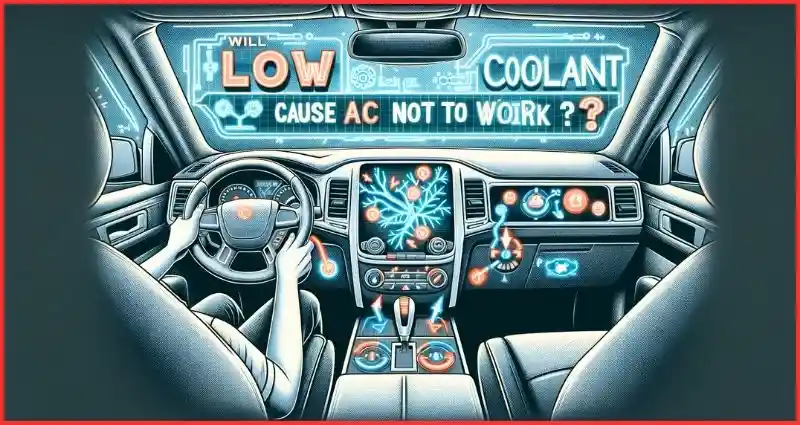Low coolant can cause the AC not to work due to the system’s inability to regulate temperature. When coolant levels are low, the AC compressor may not engage, leading to warm air blowing from the vents.
This can be caused by a leak in the cooling system or insufficient coolant levels. It’s essential to address low coolant levels promptly to prevent potential damage to the AC system and ensure proper functionality.
Proper maintenance and regular checks of coolant levels can help avoid AC issues related to low coolant. Regularly monitoring coolant levels and addressing any leaks promptly will help maintain the AC system’s optimal performance.
Importance Of Coolant In Ac System

Proper coolant levels are essential for the efficient functioning of the AC system in your vehicle. The coolant, also known as refrigerant, plays a crucial role in the cooling process by absorbing heat from the air inside the car and releasing it outside.
Maintaining the correct level of coolant not only ensures optimal cooling performance but also prolongs the lifespan of your AC system.
Significance In Cooling Process
The coolant in the AC system undergoes a continuous cycle of absorbing heat from the air inside the vehicle and releasing it outside, thereby cooling the interior.
Without adequate coolant levels, the AC system will struggle to cool the air effectively, resulting in decreased comfort for passengers.
Coolant Levels And Ac Performance
Maintaining the appropriate coolant level is paramount for the overall performance of the AC system. Insufficient coolant can lead to inadequate cooling capacity, causing the AC to work harder and less efficiently.
When the coolant levels are too low, it may even lead to the AC compressor not engaging, resulting in a complete failure of the AC system. Regular checks and maintenance of coolant levels are crucial to prevent such issues.
Impact Of Low Coolant Levels On Ac Functionality
The impact of low coolant levels on AC functionality can be significant, as the cooling system plays a vital role in regulating the temperature for both the engine and the air conditioning unit.
Insufficient coolant can directly affect the performance of the AC system, leading to various issues that can hinder its functionality.
Effects On Refrigerant Cycling
Low coolant levels can disrupt the refrigerant cycling in the AC system. Inadequate coolant can lead to an imbalance in the refrigerant pressure, causing the AC compressor to work harder and potentially malfunction.
This can result in reduced cooling efficiency and overall performance of the AC unit, leading to discomfort for the occupants.
Impaired Heat Exchange
When the coolant levels are low, it can impair the heat exchange process within the AC system. Insufficient coolant diminishes the capacity of the system to absorb heat effectively, leading to decreased cooling output.
This can result in uneven cooling or struggling to maintain the desired temperature inside the vehicle.
Signs Of Low Coolant Causing Ac Malfunction

If your vehicle’s air conditioning (AC) system is not functioning properly, it could be due to low coolant levels. When the coolant level is low, it affects the overall performance of the AC system, leading to several noticeable signs.
It’s important to be aware of these signs so that you can address the issue promptly and avoid potential damage to your car’s AC system. Let’s explore the signs of low coolant causing AC malfunction.
Weak Airflow
One of the indicators of low coolant causing AC malfunction is weak airflow from the vents. When the AC system lacks sufficient coolant, it struggles to generate the required pressure to push air through the vents.
As a result, you may notice a significant decrease in the strength of the airflow, making it challenging to achieve the desired cooling effect inside the vehicle.
Warm Air Blowing From Vents
Another evident sign of low coolant impacting the AC system is the presence of warm air blowing from the vents. Inadequate coolant levels can disrupt the cooling process, leading to the circulation of warmer air instead of the cool air expected from the AC system.
If you experience warm air coming from the vents even when the AC is turned on, it’s a clear indication that low coolant levels may be the culprit.
Unusual Noises
Low coolant levels can also result in the emission of unusual noises from the AC system. When coolant is insufficient, the AC compressor may experience added strain, causing it to produce abnormal sounds such as rattling, squealing, or grinding.
These noises serve as a warning that the AC system is not functioning optimally and requires immediate attention to prevent further damage.
Steps For Evaluating Coolant Levels In The Ac System
When it comes to maintaining your car’s air conditioning (AC) system, ensuring proper coolant levels is crucial for its efficient functioning. Low coolant levels can cause the AC not to work effectively, leading to inadequate cooling and potentially damaging the system.
Here are the essential steps for evaluating coolant levels in the AC system to keep your car’s interior cool and comfortable during hot summer days.
Inspecting Coolant Reservoir
Begin by locating the coolant reservoir in your vehicle. Typically, it is a translucent plastic tank with minimum and maximum level markings.
Carefully inspect the reservoir to ensure that it is intact, without any cracks or leaks. Any damage to the reservoir could lead to loss of coolant, affecting the AC system’s performance.
Checking Coolant Levels And Quality
After locating the reservoir, check the current coolant levels. Ensure the engine is cool before opening the reservoir cap to avoid burns from hot coolant.
The coolant levels should ideally be between the designated minimum and maximum marks. Additionally, assess the quality of the coolant. It should appear clear and free from any debris or discoloration.
If the coolant looks murky or contaminated, it may indicate an issue with the cooling system that needs to be addressed promptly.
Identifying Leakages
Next, it’s crucial to inspect the vehicle for any signs of coolant leakages. Look for puddles of coolant under the car or damp spots in the engine compartment, which could indicate a leak.
Additionally, check the hoses, connections, and other components of the AC system for visible signs of coolant leaks. Identifying and addressing any leakages promptly can prevent further damage to the AC system and ensure efficient cooling performance.
Resolving Low Coolant Issues To Restore Ac Functionality
Coolant Refilling And Purging Air From The System
Coolant level in a vehicle’s AC system plays a crucial role in maintaining optimal cooling performance. When the coolant level is low, the AC may not function efficiently or stop working entirely.
To resolve this issue, it is essential to refill the coolant system and purge any trapped air. This process typically involves adding the appropriate coolant mixture to the reservoir and then running the engine with the AC on to remove air bubbles from the system.
Repairing Leakages
Leakages in the coolant system can lead to a gradual decrease in coolant levels, impacting the proper functioning of the AC. Identifying and repairing these leaks is vital to restore AC functionality.
Leakages can occur in various components such as hoses, gaskets, or the radiator. By inspecting these parts thoroughly, you can pinpoint the source of the leak and proceed with necessary repairs, such as replacing damaged components or sealing the leaks with appropriate solutions.
System Pressure Testing For Integrity
Performing a system pressure test can help in identifying any potential integrity issues within the coolant system. This test involves pressurizing the system to detect leaks or weaknesses.
By evaluating the pressure readings and observing for any drops over time, you can determine the overall integrity of the coolant system. Addressing any shortcomings found during the pressure test can prevent future coolant-related AC issues.
Credit: www.angi.com
Frequently Asked Questions On Will Low Coolant Cause Ac Not To Work?
Can Low Coolant Cause Ac Problems?
Yes, low coolant can lead to poor AC performance by affecting the system’s cooling capacity.
What Are The Signs Of Low Coolant In A Car?
Signs of low coolant include overheating, decreased AC performance, and a low coolant warning light.
How Does Low Coolant Affect Ac Cooling?
Low coolant reduces the system’s ability to dissipate heat, leading to diminished AC cooling capabilities.
What Should I Do If My Car Has Low Coolant?
If you suspect low coolant, check the levels and top off if necessary or seek a professional inspection.
Conclusion
Low coolant levels can definitely impact the functionality of your AC system. It’s crucial to regularly maintain coolant levels to ensure optimal performance. If you notice any issues with your AC, check your coolant levels and address any leaks promptly.
With regular maintenance, you can keep your AC running smoothly.
